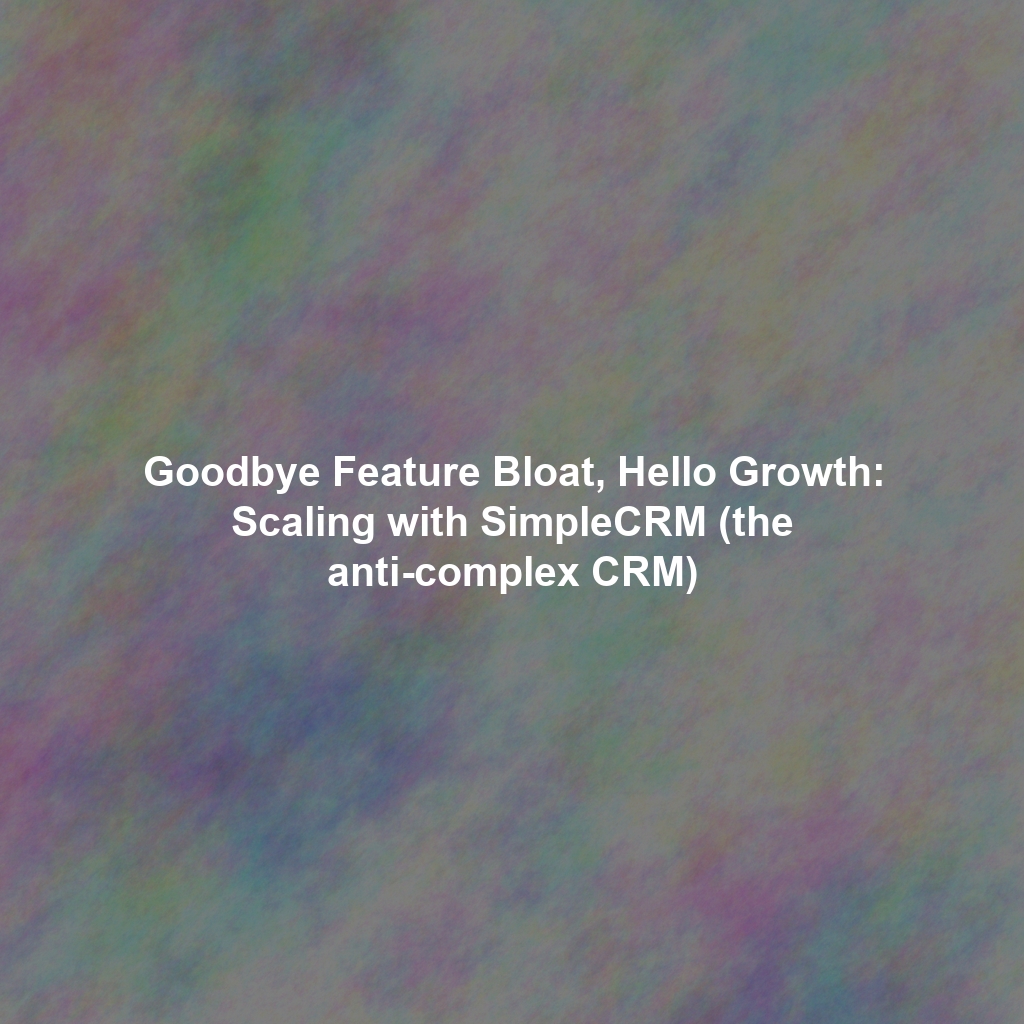Goodbye Feature Bloat, Hello Growth: Scaling with SimpleCRM (the anti-complex CRM)
Ever bought a tool with a million features, only to use two or three? That’s how it feels to use a complex CRM when you’re trying to grow. You’re paying for features you don’t need, spending ages learning them, and only using a small part of it.
That extra, unused stuff isn’t just sitting there quietly. It can actually hurt your growth. It clutters up the interface, slows your team down, and hides important data under a mountain of options you don’t even use.
Why Complex CRMs Can Hinder Growth
Remember trying to find one setting in a program crammed with features? Annoying, right? This frustration causes real problems for growing businesses:
- Lost Productivity: Wasting hours training employees on features they’ll never use is a huge drain. That time could be spent closing deals, building relationships with leads, or improving your product.
- Data Overload: Complex CRMs often capture too much information. This makes it hard to find the key metrics that actually drive your business. You’re drowning in data but starving for real insights.
- Slow Adoption: The harder a system is to use, the less likely your team will use it well. Change is hard, and a tough learning curve just makes things worse.
- Hidden Costs: Besides the initial cost, many complex CRMs charge extra for add-ons, integrations, and support. These costs can quickly add up as you grow.
Basically, a CRM that’s too complex gets in the way. It stops your business from moving fast and efficiently.
How SimpleCRM Helps Businesses Scale Without Feature Bloat
The solution? A CRM that keeps things simple and focuses on what you *really* need to grow. That’s where SimpleCRM comes in. It’s designed to be easy to use and, most importantly, effective.
Here’s how SimpleCRM helps businesses scale:
- Focus on Essentials: SimpleCRM cuts out the unnecessary and focuses on core CRM functions like managing contacts, tracking sales, and creating reports. This lets your team focus on what matters most: building relationships and closing deals.
- Easy Onboarding and Training: With a simple interface, your team can learn how to use SimpleCRM quickly. Less time on training, more time making money.
- Scalable Pricing: SimpleCRM offers clear, predictable pricing that grows with your business. You only pay for what you need, avoiding hidden costs. You might even find options like a no user fee CRM, freeing up funds for other growth areas.
- Improved Collaboration: A simple CRM makes it easier for team members to share information and track progress. Everyone’s on the same page, which leads to better communication.
- Actionable Insights: SimpleCRM gives you clear reports that help you understand your sales and find areas to improve. No more digging through tons of data to find what you need.
Think of SimpleCRM as a lean, agile athlete compared to a bulky bodybuilder. One is built for performance, the other for show.
Case Studies: Small Businesses Scaling with SimpleCRM
Let’s look at some real-world examples. We’ve anonymized them, but these stories show what businesses have achieved by using a simpler CRM approach.
Case Study 1: The SaaS Startup
A SaaS startup, “CodeCraft,” was struggling to manage their growing customer base with spreadsheets. They thought about getting a complex CRM but were scared off by the learning curve and high price. They switched to SimpleCRM and saw results right away.
In the first month, CodeCraft saw a 20% increase in lead conversion rates. Their sales team could track leads better and personalize their outreach. The simple reporting features also helped them find their most profitable customer segments and tailor their marketing accordingly.
Case Study 2: The E-commerce Business
An e-commerce business, “TrendyThreads,” was drowning in customer data but couldn’t find useful insights. They were using a complex CRM that was overwhelming their team and hurting their ability to provide personalized customer service. After switching to SimpleCRM, TrendyThreads saw happier customers.
The streamlined contact management features let their customer service team quickly access customer information and solve problems faster. The simple automation features also helped them send personalized email campaigns, which led to a 15% increase in repeat purchases.
Case Study 3: The Consulting Firm
A small consulting firm found their complex CRM was more trouble than it was worth. Consultants weren’t using it, which led to inconsistent data and missed opportunities. After implementing SimpleCRM, adoption rates went way up.
The consultants found the CRM easy to use on the go, so they could log interactions and update deal stages quickly. The better data visibility allowed the firm’s management team to track performance and find areas where consultants needed help.
Cost Comparison: Scaling SimpleCRM vs. Complex CRMs
Beyond being easier to use, SimpleCRM often saves you money compared to complex CRMs, especially as you grow. Here’s a quick comparison:
Complex CRM:
- High subscription costs
- Per-user pricing (gets expensive as your team grows)
- Expensive add-ons and integrations
- High training and support costs
SimpleCRM:
- Lower subscription costs
- More flexible pricing options (including possible no user fee options)
- Fewer add-ons needed
- Lower training and support costs
Basically, a complex CRM can become a big expense, especially for a growing business. SimpleCRM offers a more affordable and scalable solution.
Making the Switch
If you’re feeling bogged down by a complex CRM, it might be time to think about a simpler option. Here are some steps you can take:
- Identify Your Needs: What core CRM functions do you need to grow? Focus on these essentials and avoid unnecessary features.
- Research Simple CRM Options: Check out different Simple CRM providers and compare their features, pricing, and ease of use.
- Request a Demo: Schedule a demo with a few providers to see how their platforms work and whether they meet your needs.
- Start Small: Implement SimpleCRM with a small team first to test it out and get feedback before rolling it out to the whole company.
- Migrate Your Data: Carefully plan your data migration to make sure your existing data is transferred accurately and securely to the new CRM.
Growing a business is tough enough. Don’t let a complex CRM hold you back. Embrace simplicity and focus on what really matters: building relationships, closing deals, and growing your revenue. SimpleCRM, with its focus on essential features and ease of use, can be the partner you need to manage the complexities of growth. Find out more at SimpleCRM.com


